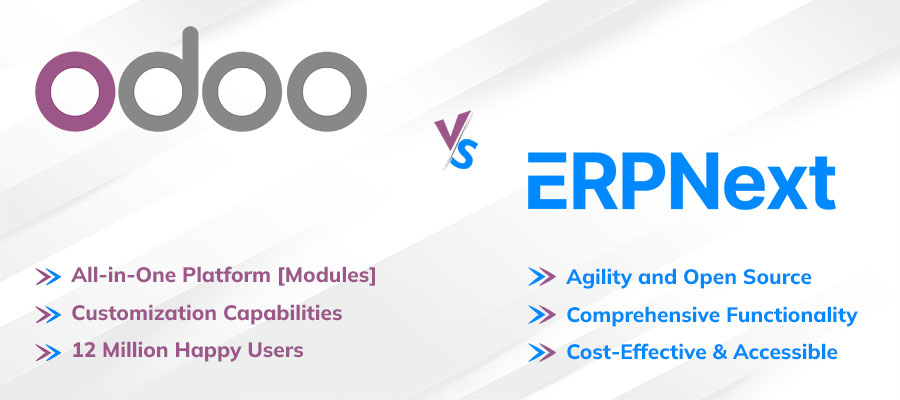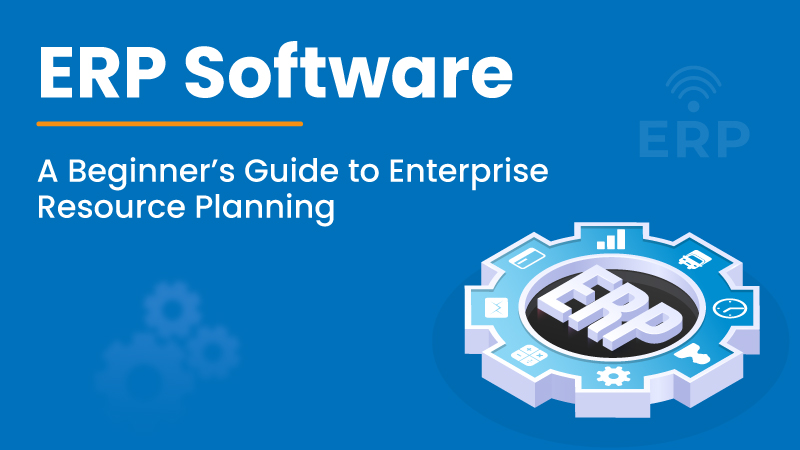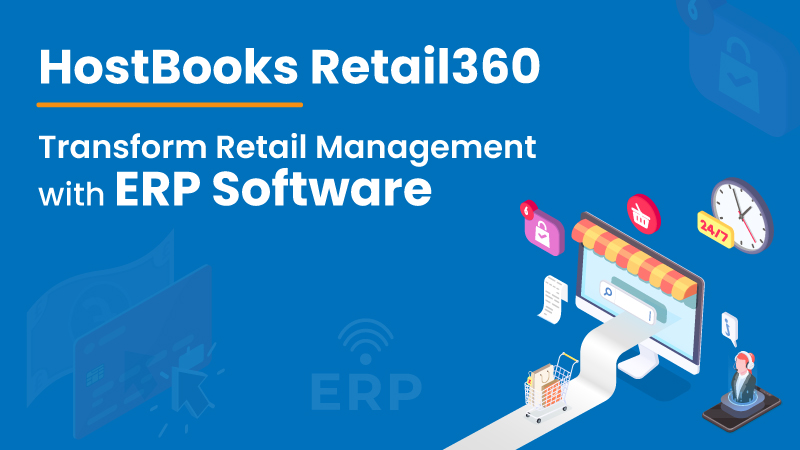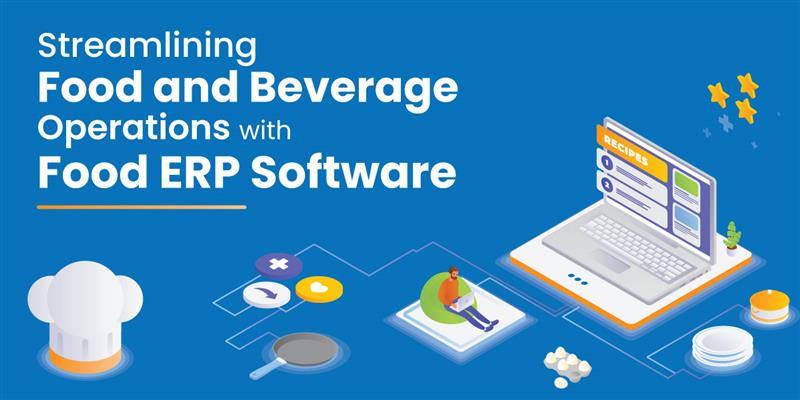Odoo VS. ERPNext: Which One is the Right ERP?

Selecting the right Enterprise Resource Planning (ERP) solution is a critical decision and the cost of wrong selection is massive. When you go beyond SAP, NetSuite, and Microsoft Dynamics (which are super expensive) the choice becomes harder.
There are two more players, Odoo and ERPNext, and these two could are extremely confusing choices. So, let’s go ahead and compare them based on all possible aspects and parameters.
Note: This post is impartial and not sponsored in any manner. I’ve personally sifted through customer reviews on software marketplaces, other unbiased comparison blogs, vendor websites, and even product documentation.
Comparison Summary: ERPNext vs Odoo
Here is a short overview of the comparison, highlighting key aspects to aid in your decision-making process.
| Criteria | Winner | Reason |
|---|---|---|
| Features and Functionalities | ERP Next | QR Code Support, Quick Barcode Scan, Batch Picking |
| Scalability | Odoo | Broader track record in larger enterprises |
| Integration Capabilities | Odoo | Rich app ecosystem and strong community |
| Implementation | ERP Next | Dedicated implementation team and 30-day trial |
| Customization | Odoo | Modular structure and extensive customization |
| Ease of Use | Tie | Both platforms have pros and cons in usability |
| Learning Ecosystem | Odoo | Larger community, extensive resources |
| Total Cost of Ownership | Tie | Consideration of integration and customization |
| User Reviews and Ratings | ERP Next | Higher ratings across various platforms |
| Userbase | Odoo | Larger reported user base |
| Ongoing training and Support | Tie | Odoo-More structured, ERPNext: More Dedicated |
I have explained each section with Proof, so if you want confirmation, just read each section.
Before we start here is the short Description of each ERP with their USPs.
Odoo ERP
Odoo ERP is a comprehensive and highly versatile business management suite, renowned for its adaptability and holistic approach to enterprise resource planning. The best part of Odoo ERP is -it has both Open-source (completely free) and enterprise plans.
The three major USPs of Odoo are:
- All-in-One Platform with Extensive Modules
- Open-Source Community and Customization Capabilities
- Global Reach with 12 million Happy Users
ERPNext
ERPNext is an agile and open-source Enterprise Resource Planning (ERP) solution designed to cater to the needs of small and medium-sized enterprises (SMEs). Its three major unique selling propositions (USPs) can be summarized as follows:
- Agility and Open Source
- Comprehensive Functionality
- Cost-Effectiveness and Accessibility
General Differences Between Odoo VS. ERPNext
There are several distinctions between ERPNext and Odoo that, while not critically impactful, are noteworthy. These encompass variations in the underlying technology stack, market niche, overall target audience, user base demographics, historical background, and other miscellaneous factors.
Although these distinctions may not significantly sway decision-making, providing a comprehensive overview ensures a well-rounded understanding of both systems.
Comparison Criteria and Priority
We will be comparing ERPNext and Odoo using the criteria outlined in the table below. As there is no definitive winner and priorities vary depending on the size and industry of businesses, I have assigned priorities for each criterion for both medium and large-sized enterprises.
| Criteria | Priority for Medium Sized Enterprises | Priority for large Enterprises |
|---|---|---|
| Features and Functionalities | High | High |
| Scalability | High | Medium |
| Integration | Medium | High |
| Implementation | High | High |
| Customization | Medium | High |
| Ease of Use | High | Medium |
| Learning Resources | High | Medium |
| Finding Employees | High | Medium |
| Total Cost of Ownership | High | Low |
| Reviews and Rating | Medium | High |
| User Base | High | High |
| Deployment Options | High | High |
| Ongoing Support and Training | High | Medium |
ERPNext VS. Odoo Detailed Comparison
Features and Functionalities
I’ve focused on identifying unique features that set each platform apart. This analysis emphasizes distinctions without directly comparing features present or absent in both systems.
Inventory Management
| Feature | Odoo | ERPNext |
|---|---|---|
| QR Code Support | No | Yes |
| Quick Barcode Scan (Without 3rd Party Device) | No | Yes |
| Batch Picking | No | Yes |
Supply Chain
| Feature | Odoo | ERPNext |
|---|---|---|
| Supplier Self Service Portal | No | Yes |
| Contracts/Purchase Agreements | No | Yes |
Manufacturing
| Feature | Odoo | ERPNext |
|---|---|---|
| Automated Time Tracking | Yes | No |
Marketing
| Feature | Odoo | ERPNext |
|---|---|---|
| Leads Tracking (Visited Pages) | Yes | No |
| Email Campaigns (Drip Emails) | No | Yes |
Reporting
| Feature | Odoo | ERPNext |
|---|---|---|
| Dynamic Pivot Table | Yes | No |
| Sales Forecasts | Yes | No |
Winner: ERPNext has a slight edge overview when it comes to a few features.
However, since each business’s decision-making factor differs you can choose the best one for your business depending on your preferences.
Scalability
Odoo
Odoo exhibits robust scalability owing to its modular structure, enabling businesses to commence operations with essential modules and expand seamlessly as their requirements evolve.
The platform’s adaptability is underscored by its extensive customization options, allowing for tailoring to specific business processes. With a widely adopted system across diverse industries, including large enterprises, Odoo benefits from a large and supportive community.
ERPNext
ERPNext offers scalability features designed to accommodate the growth of small to medium-sized businesses. The platform provides an integrated suite of applications, ensuring consistency in data management as businesses expand.
While its comprehensive feature set caters to scalability, very small businesses may find the system overly complex. Additionally, the resource intensiveness required for running ERPNext, potentially necessitating dedicated servers and IT resources, pose considerations for certain small enterprises.
Winner: Odoo
Odoo has a broader track record of being successfully implemented in larger enterprises. The modular structure, flexibility, and the extensive support ecosystem make Odoo a more versatile solution for businesses with complex scalability needs.
Integration Capabilities of ERPNext and Odoo
Odoo
Odoo’s modular structure supports seamless connections between its numerous modules, offering over 39,000 apps for tailored integrations. Its app ecosystem and large community provide diverse options for third-party integrations, enhancing flexibility.
ERPNext
ERPNext’s integrated suite approach ensures consistent data across the organization. While supporting third-party integrations, it focuses on open-source and community-driven development. However, the community is still growing, and you might not find already existing options.
Winner: Odoo
Odoo’s app ecosystem, modular structure, and strong support from a large community of developers contribute to a rich environment for integration possibilities.
Implementation
Odoo
Odoo offers quick implementation over the cloud, providing flexibility and customization options. However, reviews suggest that while Odoo is straightforward, it may lack the depth of professional-level automation for entire business operations.
ERPNext Implementation
ERPNext offers a 30-day free trial, allowing users to test its functionalities. Moreover, their team ensures seamless ERP implementation tailored to your business needs, incorporating automation and customer integration. However, implementation cost increases due to custom requirements.
Winner: ERPNEXT
ERPNext takes the lead in end-to-end business automation dedicated implementation team.
Customization
Odoo
Odoo excels in customization, offering extensive flexibility for businesses with intricate needs. Using Python, it allows the creation of custom apps and modifications, providing a highly tailored ERP experience. The modular structure permits businesses to choose specific modules, but this flexibility introduces complexity, especially in larger setups. Also, the large developer community ensures diverse customization options and robust support.
ERPNext
ERPNext adopts a unified and user-friendly approach with customization options through scripting and Python. While not as deeply customizable as Odoo, it provides streamlined experiences for small to medium-sized enterprises. The smaller community is dedicated and responsive, offering support for businesses with less complex requirements.
Winner: Odoo
Odoo’s modular structure and extensive ecosystem offer a broad spectrum of customization options.
Ease of Use
Odoo
Odoo prioritizes a fast and efficient user interface with an emphasis on speed and streamlined processes. Accessible across web, Mac, Android, and iPhone/iPad platforms, it offers a versatile experience. On reading reviews on software marketplaces users have mentioned occasional concerns about initial inflexibility.
ERPNext
ERPNext is available on the web, iPhone, and Android. It provides cross-platform accessibility and users have praised its open-source and customizable features but express concerns about user experience challenges, especially in the manufacturing module, and documentation issues.
Winner: Both
Learning Ecosystem
Odoo Learning Resources: Odoo boasts a global community of over 100,000 developers, providing extensive documentation, training sessions, webinars, and certifications. Odoo Studio enhances customization, while active forums facilitate collaborative learning.
ERPNext Learning Resources: ERPNext, with a smaller community, emphasizes simplicity and encourages certification. While some user’s express documentation concerns, the community is known for its responsiveness.
Conclusion: Odoo offers a comprehensive learning ecosystem with a larger community, while ERPNext focuses on simplicity and certification, catering to different preferences.
Total Cost of Ownership
Odoo
Odoo provides a complimentary option for one app, allowing unlimited users at zero cost.
For subscriptions, Odoo presents two primary plans.
- The Odoo Online Standard plan is priced at Rs 950 per user per month (after discount), providing access to all apps.
- The Odoo Online Custom plan, available at Rs 1,420 per user per month (after discount), with specific features like Odoo Studio for customization, multi-Company support, and External API integration.
There is no clear pricing plan for customizations and integrations.
ERPNext
ERPNext offers a straightforward pricing model designed for different business scales.
- Under the Small Business plan, priced at ₹4,100 per month, users benefit from unlimited users, managed hosting, and product warranty, suitable for teams with approximately 50 employees.
- The Enterprise plan, featuring custom pricing, is tailored for organizations with complex processes. It includes unlimited users, managed hosting, product warranty, an account manager, priority SLA, phone support, and large database support.
Again, the cost of customizations and integrations is not mentioned clearly.
Winner: Tie
While at first glance it looks like Odoo has a better plan – you need to consider the cost of integrations and customizations required to implement ERP rightly. The plan cost would be almost negligible compared to the implementation cost.


















